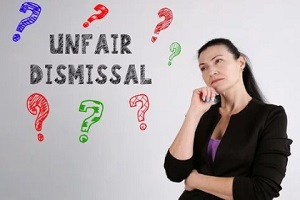 Being fired from your job can be devastating both financially and emotionally. In California, an at-will employment state, most jobs can be terminated by the employer (or employee) at any time and for any reason, with or without notice.
Being fired from your job can be devastating both financially and emotionally. In California, an at-will employment state, most jobs can be terminated by the employer (or employee) at any time and for any reason, with or without notice.
However, it is still possible to be wrongfully terminated in California, and if so, you could be entitled to compensation for lost wages and benefits, back pay, emotional distress, attorney’s fees, and more.
What Does it Mean to be Wrongfully Terminated in California?
Wrongful termination, in California, means that your employer terminated your employment for reasons that were against the law or public policy. There are some exceptions to at-will employment in California, that may allow an employee who was fired to sue their employer for wrongful termination.
These exceptions are as follows:
1. Violation of Public Policy
This type of wrongful termination is based on public policies created either federally or through the state. Firing an employee for taking time off to serve on a jury, for example, would be a violation of public policy as it is protected by the federal government.
General Retaliation
One of the most common violations of public policy occurs when an employee engages in a legally protected activity, and an employer fires them in retaliation. This could be, for example, because the employee filed a complaint with the Equal Employment Opportunity Commission or reported someone for sexual harassment. In either case, the employee would have a claim for wrongful termination.
Whistleblower Retaliation
 Whistleblower retaliation is a particular type of retaliation for which both state and federal laws provide a cause of action. When you report your employer for engaging in illegal activity, you are still legally entitled to keep your job. In other words, you cannot be fired because you reported your employer for a violation of any law, regulation, or ordinance.
Whistleblower retaliation is a particular type of retaliation for which both state and federal laws provide a cause of action. When you report your employer for engaging in illegal activity, you are still legally entitled to keep your job. In other words, you cannot be fired because you reported your employer for a violation of any law, regulation, or ordinance.
To prove wrongful termination in California based on retaliation, you will need to establish the following three elements:
- You were engaged in a legally protected activity
- The activity prompted your employer to act; and
- Your employer’s actions had an adverse reaction on your employment, e.g. you were fired.
2. Discrimination Against a Protected Class
No matter what state you live in, discrimination based on race, national origin, sex, religion, age, disability, or pregnancy is illegal. However, it can be difficult to prove that a firing was actually discriminatory in an at-will employment state.
Having evidence of discrimination before the firing, or proof of your employer using discriminatory reasoning for your firing, is needed to successfully sue for wrongful termination based on discrimination.
3. Breach of Implied Contract
This exception recognizes that it is a breach of contract for your employer to fire you if job security was either written or implied in your contract or through other promises made before your employment began. Always document and keep proof of any written or implied promises related to your employment.
4. Breach of Implied Covenant of Good Faith and Fair Dealing
With every legal contract, there is an “implied covenant of good faith and fair dealing.” This means that the parties to the contract implicitly promise not to do anything to unfairly undermine each other’s ability to benefit under the agreement.
This means that if you were employed under a contract (expressed or implied), and your employer has done something ethically wrong by firing you, you have been wrongfully terminated. This can include actions such as:
- Firing you to prevent you from collecting commissions or other benefits you would otherwise be entitled to receive
- Making up a reason to fire you when they really only wanted to replace you with someone willing to work for less money; or
- Making your work life harder to coerce you into quitting.
If you believe that the circumstances surrounding your termination mirror any of the exceptions to at-will employment in California discussed above, you may have grounds for a wrongful termination lawsuit and should contact an experienced attorney to determine what your next steps should be.
Wrongfully Terminated in California? Contact Lehr Law, APC Attorneys For Assistance
 If you believe that you have been wrongfully terminated, it is important to consult with a lawyer that not only has experience with cases similar to yours but also offers a consultation and works on a contingency fee.
If you believe that you have been wrongfully terminated, it is important to consult with a lawyer that not only has experience with cases similar to yours but also offers a consultation and works on a contingency fee.
At Lehr Law, APC, we offer a consultation with an experienced California employment lawyer who can determine whether you have enough evidence for a successful wrongful termination case.
Let us represent your rights with our knowledge of the local court structure and processes. California law limits the amount of time you have to file a wrongful termination claim. Contact Lehr Law today at (858) 240-9993 or request a consultation online.
